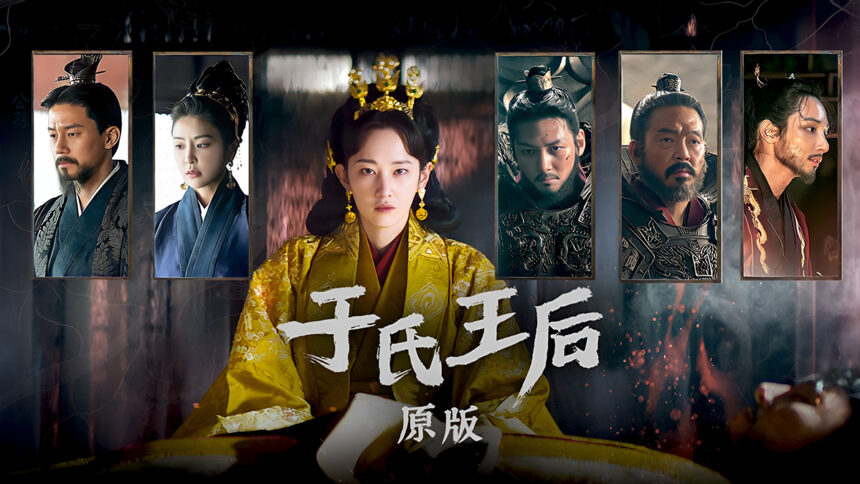Queen Woo 2024 is a South Korean masterpiece in the historical drama (sageuk) genre, centers on the ambitious and cerebral Queen Woo Hee of Goguryeo. Packaged as an action-filled sageuk, the series merges intense political intrigue with epic survival stakes. Directed by Jung Se-kyo and written by Lee Byoung-hak, the gripping eight-episode drama has a sharp narrative drive. What sets Queen Woo apart is its fearless protagonist, portrayed by the multi-talented Jeon Jong-seo, in a career-first historical role. With lavish visuals, stirring performances, and a complex portrayal of power, Queen Woo is a standout saga tackling resilience in politics, gender roles, and survival under pressure.
Plot Overview
Set in ancient Goguryeo, the story begins with a national crisis following the sudden death of King Gogukcheon (played by Ji Chang-wook). Power-hungry factions and five tribes begin circling the throne, eager to install their chosen successor. Woo Hee (Jeon Jong-seo), the late king’s widow, finds herself at the epicenter of this chaos. Rather than remaining a passive figure amidst warring factions, Woo Hee seizes control of her destiny. Tasked with securing the Goguryeo throne within 24 hours and protecting her family, she strikes a bold and controversial move. Woo Hee sets out to marry one of the king’s eligible younger brothers, ensuring stability and survival for her people and herself.
Her intelligence, beauty, and cunning efforts lead her to outwit adversaries, survive assassination attempts, and endure betrayal. Woo Hee’s story charts her evolution from queen to a historical trailblazer, becoming the first recorded woman in Koreanic history to ascend the throne twice. The clock-ticking premise adds a tense, heart-pounding urgency to her mission while revealing layers of tribal alliances, personal sacrifice, and maternal instincts.
Woo Hee’s Role and Character Significance
Woo Hee serves as the beating heart of Queen Woo. Her tenacity reflects the series’ overarching themes of independence and survival in a patriarchal society. While steeped in physical and intellectual courage, Woo Hee is no straightforward heroine. Her decisions reveal the complex shades of ambition, vulnerability, and personal cost behind leadership.
Woo Hee’s role offers a rare take on women steering historical narratives. Forced into action by the aggressive political environment, she epitomizes resourcefulness and willpower, overshadowing even her male counterparts. Her internal conflicts and resilience resonate deeply with the audience, especially as she balances protecting her people with maintaining her integrity.
The series also explores the intersections of family and politics. While Woo Hee acts in self-interest at times, her loyalty to Goguryeo and her desire for justice speak louder. Whether wielding the political game board or defending morality against tribal ambitions, she proves herself essential to both her family’s survival and her kingdom’s future.
Jeon Jong seo Queen Woo Powerful Performance
Jeon Jong-seo as Woo Hee delivers an electrifying and layered performance. Known for her breakout role in Burning and subsequent critically acclaimed appearances in The Call and Money Heist: Korea, Jeon tackles her first historical drama with grace and gravitas. Her portrayal manages to capture both Woo Hee’s steely command and the emotional weight of her precarious position.
Jeon’s nuanced acting brings authenticity to Woo Hee’s moments of quiet reflection and bursts of fierce determination. Whether in intense negotiation scenes or commanding action sequences, her performance is magnetic and deeply human. Her chemistry with co-stars Kim Mu-yeol (Eul Pa-so, Goguryeo’s prime minister) and Lee Soo-hyuk (Go Bal-gi, a contender for the throne) adds further weight to Woo Hee’s leadership struggles and personal sacrifices.
For Jeon, stepping into Woo Hee’s ornate regalia marked a departure from her modern, nail-biting thrillers. Yet, she has excelled at delivering a character who feels both grounded in history and strikingly relevant to contemporary audiences. Director Jung Se-kyo praised Jeon’s ability to “convey Woo Hee’s progressive yet honest spirit,” aligning with the director’s vision to celebrate a female-led story of power and survival.
Themes in Queen Woo
Thematically, Queen Woo offers more than period drama tropes. Its bedrock lies in exploring survival in the face of overwhelming odds. Queen Woo Hee’s actions symbolize rebellion against societal norms and expectations for women, making the series a celebration of agency.
Political ambition, duty, and personal loss play heavily throughout the narrative. The urgency to secure power within a limited timeline mirrors modern struggles for control and legacy, adding contemporary resonance to Woo Hee’s saga. Rivalries among the tribes serve as a backdrop to the timeless themes of greed, alliances, and loyalty.
The series also sheds light on gender dynamics in a historical context. Woo Hee is a woman no longer content with being relegated to the background of history. Instead, she writes her own story, fighting not only for her tribe but for recognition in the annals of Korean legend.
Visually, Queen Woo recreates ancient Goguryeo with lavish production design, drawing inspiration from surviving artifacts and murals. Combining authentic historical research with modern dramatization, the series enriches its political landscapes while embellishing them with compelling drama.
Critical Reception
Queen Woo launched to mixed but significant reviews. While some critics praised the swift pacing, grand sets, and masterful action choreography, others found occasional lapses in character development. Jeon Jong-seo, however, received near-universal acclaim for her riveting performance, with many labeling her Woo Hee as the series’ strongest element.
The production’s $30 billion won budget spurred lively debates, particularly over claims of historical inaccuracy in costumes and props. Nonetheless, audiences and critics appreciated the creative liberties, with media historians defending the blend of authenticity and artistic interpretation.
Though the series ended with an open conclusion, sparking speculation about future seasons, the gripping dynamics of the first season ensured its cultural impact. Viewership remained high across its streaming platforms, including TVING and Viu, capturing both domestic and international audiences hungry for imaginative sageuks.
Legacy of Queen Woo
Queen Woo is more than a lavish action-drama; it is a profound tribute to one woman’s courage in charting her own course. Jeon Jong-seo’s Woo Hee bridges storytelling and cultural history, adding an unforgettable character whose name resounds within South Korea’s period drama canon. Amidst its pulse-pounding power struggles, the show underscores that narratives belong not just to those who inherit thrones but also to those who dare to seize them.
With its commanding heroine and bold themes, Queen Woo (2024) stands as proof that historical fiction, when told with vision and heart, can inspire and entertain across generations. Jeon Jong-seo anchors the drama with unapologetic pride, crafting a Woo Hee who will endure both as a trailblazer and a queen worth remembering.






